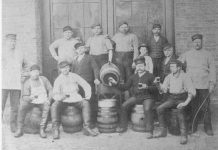 This Saturday (5 March; temperatures expected in the low 70s) Tailspin Ale Fest is back to its regularly scheduled program and location at historic Bowman Field, but if you’ve snoozed on VIP tickets, that plane’s already flown. General admission ducats are still available, and don’t even thinking waiting until the day of the show; sellouts are customary, and in any event, there’ll be no gate sales at Tailspin.
This Saturday (5 March; temperatures expected in the low 70s) Tailspin Ale Fest is back to its regularly scheduled program and location at historic Bowman Field, but if you’ve snoozed on VIP tickets, that plane’s already flown. General admission ducats are still available, and don’t even thinking waiting until the day of the show; sellouts are customary, and in any event, there’ll be no gate sales at Tailspin.
Tailspin Ale Fest may or may not be your cup of Rocky Mountain Oyster Stout, but the all-things-beer bacchanal is one of the finest regional festivals of its type. Craft beer aficionados make up a passionate community, and Tailspin embodies their community values.
The festival has continued to deepen, evolve and provide reliable value for its ticket prices. Louisvillians know Tisha Gainey and her crew, and they understand that Tailspin is a year-round outreach. In short, localism matters.
Something else that matters is growing up. John Holl’s been on this beat from the start, and he has a follow-up.
In short, craft beer continues to grapple “with systemic and structural issues like sexism, racism, labor rights and more.”
Writes Holl, “many small craft breweries realize that they lack simple business infrastructure, like an employee handbook or human resources professional, needed to tackle issues when they arise and, more importantly, prevent them from happening at all.
Audra Gaiziunas, owner of Brewed For Her Ledger, a brewery consulting firm, agrees. She believes that the last seven months show what can happen when an industry known for freedom and creativity grows quickly and without a system of checks and balances.
It’s been nine months since Brienne Allan, at the time Notch Brewing’s production manager, asked her Instagram followers, “What sexist comments have you experienced?”
Hip Hops: Craft beer’s sexism problem; “The reckoning is here and it’s not going away soon”
The flood gates opened, and last summer Allan launched a consciousness-raising collaboration beer called Brave Noise, with the aim of promoting “a safe and discrimination-free beer industry.”
Hip Hops: Brave Noise? Craft beer’s sexism problem redux, plus Sugar Creek Malt Co.
Holl explains how the campaign is going.
Breweries that brew the Brave Noise pale ale must implement a code of conduct. Its July 2021 announcement got a lot of coverage and likes on social media, but, as of mid-February 2022, only 219 breweries had signed up to brew it.
That’s 219 out of 9,000, although recently the number has increased to 232; since October, Indiana’s Metazoa has joined Braxton in Kentucky as the sole participants in our two-state area, which is home to somewhere around 260 breweries.
At this juncture, there’ll be those who are eager to protest: “I just don’t want politics (social or otherwise) in my beer.”
How very tiresome.
Ironically, about the time Holl’s article was published, I was reading about the Reinheitsgebot, the famous Bavarian (later unified German) beer purity law. We tend to think the Reinheitsgebot is a dramatic affirmation of brewing standards, but originally it was enacted as a broader measure to fix prices, define (read: restrain) trade and regulate the use of cereal grains by brewers, and by logical extension, reserve some of them for exclusivity by bakers.
In terms of beers and brewing, the Reinheitsgebot is sensible insofar as it excludes adjuncts from Germanic lagers, which evolved as such in the first place to correspond with the strictures of the Reinheitsgebot. The law may have kept the corn out, but the politics were kept firmly in place, where they’ve always been, everywhere, as alcoholic beverages are concerned.
You can reject politics in your beer, and I can insist the earth is flat. We’ll both be fundamentally mistaken. The only difference between us is that I’m the only one to be regarded as a harmless eccentric.
—
I try to keep the self-aggrandizement to a bare minimum here at Hip Hops (who am I kidding?), although many readers know I’m involved with Joe Phillips’ Common Haus Hall, a German restaurant start-up project in Jeffersonville that’s coming very close to fruition (soon, I promise). It’s also my 40th year in “the beer biz,” and to celebrate, I’ve been writing. Here are the first five installments of what stands to be a year-long project in 2022.
- 40 Years in Beer, Part 1: Fun in Hi Skule
- 40 Years in Beer, Part 2: Brontosaurus Stomp, or the Time before Time Began
- 40 Years in Beer, Part 3: Did I Really Look Like A Guy with A Plan?
- 40 Years in Beer, Part 4: Scoreboard Daze of Old (First Movement)
- 40 Years in Beer, Part 5: Scoreboard Daze of Old (Second Movement)
Cover photo: Author’s collection; airplane decor in a Harlem NL cafe, 2008.
























